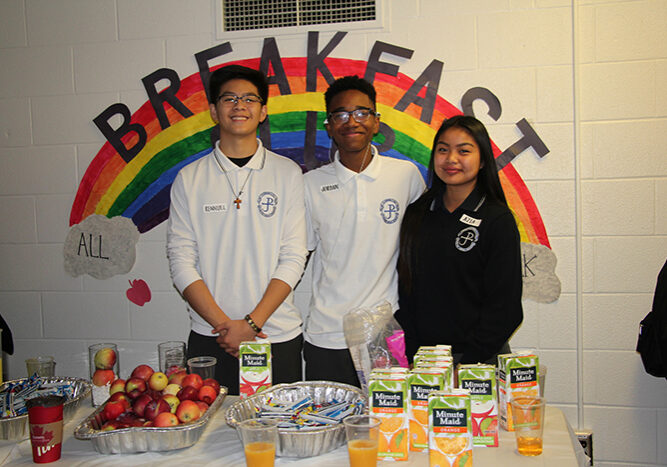THE GREEN LINE
DOCUMENTERS NOTES
MORE SCHOOL KIDS IN TORONTO ARE GOING HUNGRY. HERE'S HOW THE CITY COULD HELP.
The city's Executive Committee talked about the funding needed for school meal programs that would help children year-round, including the summertime.

Students with the Toronto Catholic District School Board breakfast program.


Taylor Simsovic
University of Toronto graduate and community worker living in Little Italy with her four rescue pets. Passionate about tackling food insecurity and engaging communities.
Nov. 6, 2024
These city meeting notes are part of Documenters Canada. Learn more about our program here.
Did you ever skip breakfast before school and spent the day hungry?
Toronto’s Student Nutrition Program makes sure that this scenario doesn’t happen.
On Nov. 5, the Executive Committee chaired by Mayor Olivia Chow talked about the funding needed to expand this initiative.
Student nutrition programs are “community-based meal and snack programs that operate primarily in school settings and are run locally by students, parents and volunteers,” according to the report presented by Dr. Eileen de Villa, Toronto’s Medical Officer of Health during the meeting. These programs are important because they “provide students energy and nutrients necessary for learning and development during the day,” the report stated.
This discussion was a follow up to an earlier City Council decision, which requested Dr. de Villa to report back to the Executive Committee on the financing needed to deliver additional student nutrition programs by January 2025.
Dr. de Villa said that funding these additional programs for the remainder of the 2024-2025 school year is an estimated $2.2 million. Funding for an entire school year on an ongoing basis is an estimated $3.9 million. She also shared that an additional one billion dollars budgeted over five years from the Federal School Food Infrastructure Fund in 2024 would help cover the expansion of the School Nutrition Program in Toronto.
Susan Wright, founder of Summerlunch+, spoke about a gap in the program: supporting children in the summertime. She added that isolation and inactivity during the summer can create loneliness and missed opportunities for development. Wright asked for the city to invest in Summerlunch+ which includes meals and cooking lessons for kids throughout the summer.
Stella Kargiannakis, a former city councillor candidate for Ward 17 Don Valley North, expressed her concerns about the Student Nutrition Program. She stated that feeding children is a parental responsibility, not a governmental one. She added that the city should focus more on increasing wages for workers as opposed to having people rely on the government for food subsidies.
What were the outcomes of the discussions?
The Committee decided to request Paul Johnson, the City Manager, to ensure that a future report on the expansion of the student nutrition program include potential partnerships with existing child and youth nutrition initiatives outside of the school year such as Wright’s Summerlunch+ non-profit.
What does our Documenter have to say?
Working at the Fort York Food Bank (FYFB), I see kids the most during the summer when the number of children coming along with their parents noticeably increases.
During the school year, parents have some relief from providing all the meals of the day as many schools in the city already have some form of student nutrition program in place. They also have the opportunity to have their children in government-funded child-care programs, and thus don’t have to bring them with them to the food bank (even though it’s a great pleasure seeing the joy on kids' faces when I give them extra juice boxes, sweets or makeshift activities for them to feel welcomed.)
The 2023 “Who's Hungry” report from Daily Bread, the parent organization to Toronto’s food banks, shows that child hunger is on the rise. From 2022 to 2023, there was a 62% increase in the number of food bank clients who are under 18. The rise of child hunger and the gap in summer programming highlights the importance of expanding the Student Nutrition Program.
Fact-Check Yourself
Sources and
further reading
Don't take our word for it —
check our sources for yourself.
Care about our city, but don't know how to make it better? Sign up for simple, step-by-step guides to solving problems in your neighbourhood — one small action at a time.
